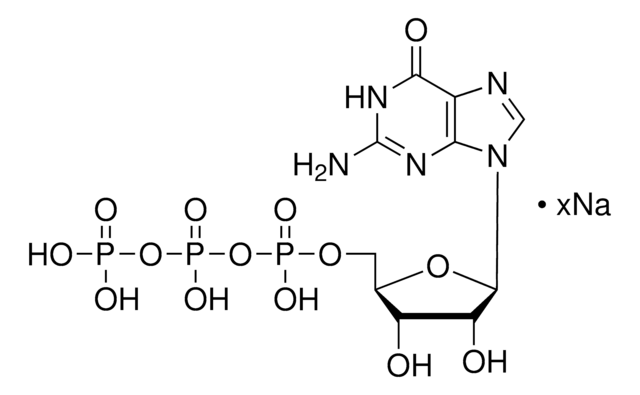I1643
Pyrophosphatase, Inorganic from baker′s yeast (S. cerevisiae)
powder, ≥500 units/mg protein (E1%/280)
Synonym(s):
Inorganic Pyrophosphatase, Pyrophosphate phosphohydrolase
Sign Into View Organizational & Contract Pricing
All Photos(1)
About This Item
Recommended Products
form
powder
Quality Level
specific activity
≥500 units/mg protein (E1%/280)
mol wt
71 kDa
storage temp.
−20°C
Looking for similar products? Visit Product Comparison Guide
General description
Molecular Weight: 71 kDa (homodimer consisting of two equal subunits of molecular weight 32-35 kDa)
Extinction Coefficient: E1% = 14.5 (280 nm)
pI: 4.75
This ubiquitous enzyme serves to drive metabolic reactions that produce pyrophosphate, since these reactions typically have equilibrium constants near unity. The catalytic mechanism has been described in the literature. Inorganic pyrophosphatase is a metalloprotease that requires Mg2+ for maximal activity. Although the hydrolysis of inorganic pyrophosphate is specific in the presence of Mg2+, both ADP and ATP can be hydrolyzed if zinc is present.
Extinction Coefficient: E1% = 14.5 (280 nm)
pI: 4.75
This ubiquitous enzyme serves to drive metabolic reactions that produce pyrophosphate, since these reactions typically have equilibrium constants near unity. The catalytic mechanism has been described in the literature. Inorganic pyrophosphatase is a metalloprotease that requires Mg2+ for maximal activity. Although the hydrolysis of inorganic pyrophosphate is specific in the presence of Mg2+, both ADP and ATP can be hydrolyzed if zinc is present.
Application
Inorganic pyrophosphatase (PPase) is a ubiquitous enzyme catalyzing the reaction PPi + H2O → 2Pi.
It plays an important role in protein, RNA, and DNA synthesis.
It plays an important role in protein, RNA, and DNA synthesis.
Pyrophosphatase has been used:
- as a component of the reaction buffer used in aminoacylation assay to quantify incorporation of [3H]L-methionine into tRNA.
- as a component of PCR mixture.
Pyrophosphatase has been used:
as a component of the reaction buffer used in aminoacylation assay to quantify incorporation of [3H]L-methionine into tRNA.
as a component of PCR mixture
as a component of the reaction buffer used in aminoacylation assay to quantify incorporation of [3H]L-methionine into tRNA.
as a component of PCR mixture
Unit Definition
One unit will liberate 1.0 μmole of inorganic orthophosphate per min at pH 7.2 at 25 °C.
Physical form
Lyophilized powder containing 80-90% buffer salts
Storage Class Code
11 - Combustible Solids
WGK
WGK 3
Flash Point(F)
Not applicable
Flash Point(C)
Not applicable
Personal Protective Equipment
dust mask type N95 (US), Eyeshields, Gloves
Certificates of Analysis (COA)
Search for Certificates of Analysis (COA) by entering the products Lot/Batch Number. Lot and Batch Numbers can be found on a product’s label following the words ‘Lot’ or ‘Batch’.
Already Own This Product?
Find documentation for the products that you have recently purchased in the Document Library.
Customers Also Viewed
Virginia P Ronchi et al.
The Journal of biological chemistry, 292(44), 18006-18023 (2017-09-20)
To understand the mechanism for assembly of Lys
Enzymatic chemiluminescence assay for inorganic pyrophosphate.
Vuokko Jansson et al.
Analytical biochemistry, 304(1), 135-137 (2002-04-24)
Laura Pedró-Rosa et al.
Journal of biomolecular screening, 20(1), 122-130 (2014-08-29)
Improved therapies for the treatment of Trypanosoma brucei, the etiological agent of the neglected tropical disease human African trypanosomiasis, are urgently needed. We targeted T. brucei methionyl-tRNA synthetase (MetRS), an aminoacyl-tRNA synthase (aaRS), which is considered an important drug target
Jin He et al.
Annals of neurology, 93(2), 244-256 (2022-09-12)
Despite the increasing number of genes associated with Charcot-Marie-Tooth (CMT) disease, many patients currently still lack appropriate genetic diagnosis for this disease. Autosomal dominant mutations in aminoacyl-tRNA synthetases (ARSs) have been implicated in CMT. Here, we describe causal missense mutations
Yibo Li et al.
Nature genetics, 46(4), 398-404 (2014-03-19)
Grain chalkiness is a highly undesirable quality trait in the marketing and consumption of rice grain. However, the molecular basis of this trait is poorly understood. Here we show that a major quantitative trait locus (QTL), Chalk5, influences grain chalkiness
Our team of scientists has experience in all areas of research including Life Science, Material Science, Chemical Synthesis, Chromatography, Analytical and many others.
Contact Technical Service







